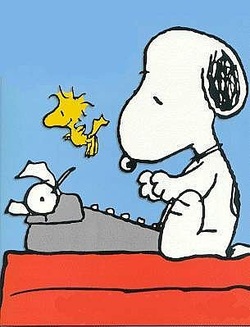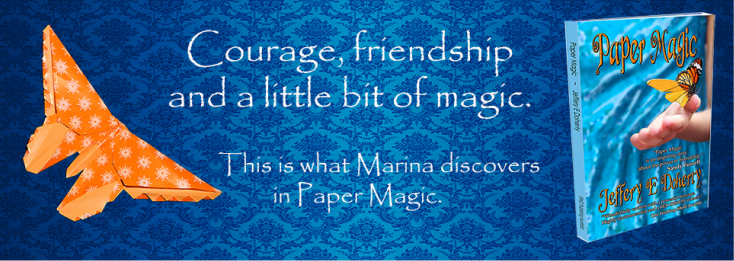Writing Tips For Kids

These tips are ones I compiled for Dee White's web site "Writing Classes For Kids"
They were published there along with a feature article about me and "Paper Magic"
If you would like to look at the full article, just follow the link above.
Here are my writing tips for all the young writers out there.
WRITING TIPS
1) My first writing tip is find characters you actually like for your story. Ask yourself, “If they were real people would I like to meet them or be friends with them?” Maybe not so much for the antagonist (bad guy) but definitely for the main characters. This is especially important for a longer book because you will be spending a lot of time having conversations with them inside your head. Make sure your main character isn’t perfect. Give them some interesting flaws. Marina from Paper Magic has to use a wheelchair and she is very anxious. If she didn’t have flaws like this the story would be boring.
2) Lots of beginning writers only use their eyes when describing things. Remember to use all of your senses. When the mean boy trips over and lands on the cow pat, what does it feel like and smell like? What sound does it make when he lands and if he lands face first, what does it taste like? Grose, yes but it lets the reader experience what is happening to the characters. You don’t need to use all of your senses for every description you use but pick the best sense for the job.
3) Everyone talks about the SHOW, DON’T TELL thing. I have to admit that when I started out writing, I didn’t understand what they were on about. It ended up not being all that hard. If your character is angry, don’t say “John was angry.” Think about a time you were angry or when you saw someone who was angry and describe what you saw and felt. For example, “John’s face turned as red as a beetroot and his glaring eyes made me want to turn and run.” Or “John clenched his hands into fists and growled, a real growl like a mad dog.” These examples are much more interesting than “John was angry.”
4) Ask yourself thewho, what, where, why, when and howquestions when you are writing the story.
”The frightened girl ran through the forest.” Who is the girl? Whatis she doing in the forest, what frightened her – was it a sound, a feeling, seeing a monster? Where is the forest, is it in the wilderness, on the edge of the town, is it a pine forest, Australian bush or a forest of alien plants on a newly discovered planet? Why is she in the situation, why is she scared, why is she being chased? When is she being chased, is it in olden times, a futuristic setting, is it day or night time? How is the girl going to get out of the situation, does she out run the thing chasing her, does she hide, does someone rescue her or is it just a figment of her imagination? These questions are brilliant for when you don’t know what to write. Asking yourself these questions can turn a simple, boring sentence into a whole scene or even a chapter of a book.
This is the method I used to write Paper Magic. The first chapter was, Marina is too scared to go and play in the park with the other children. I already knewwho so I went straight onto What? Marina wants to go to (where) the park to meet the children but she can’t. Why? She is stuck in a wheelchair and has anxiety problems. When? The last day of the holidays before starting at a new school. How does she overcome the problem? Nana gives her a magical gift that helps Marina find her courage.
5) A big part of writing a book or story is re-reading it and editing to make it the very best it can be. The first draft is never, ever perfect. I print my work out and read it with a highlighter. Any time I see the words; was, were, feel, felt, that, just, very, seem, would, should, could, thing, stuff, because, so, then, got, get, has, had, to be, and any words ending in “ly”, I highlight it. These are my whackable words and I know most of the time that sentence can be improved. In fact, nearly every time you see the word “that”, you can remove it and the sentence still makes perfect sense.
Ask yourself, “How can I make this sentence more interesting?” Also look for times when you repeat yourself, writing something very similar to something else you have already written. If you are going to go to the trouble of writing a story, make it a story you are proud of.
They were published there along with a feature article about me and "Paper Magic"
If you would like to look at the full article, just follow the link above.
Here are my writing tips for all the young writers out there.
WRITING TIPS
1) My first writing tip is find characters you actually like for your story. Ask yourself, “If they were real people would I like to meet them or be friends with them?” Maybe not so much for the antagonist (bad guy) but definitely for the main characters. This is especially important for a longer book because you will be spending a lot of time having conversations with them inside your head. Make sure your main character isn’t perfect. Give them some interesting flaws. Marina from Paper Magic has to use a wheelchair and she is very anxious. If she didn’t have flaws like this the story would be boring.
2) Lots of beginning writers only use their eyes when describing things. Remember to use all of your senses. When the mean boy trips over and lands on the cow pat, what does it feel like and smell like? What sound does it make when he lands and if he lands face first, what does it taste like? Grose, yes but it lets the reader experience what is happening to the characters. You don’t need to use all of your senses for every description you use but pick the best sense for the job.
3) Everyone talks about the SHOW, DON’T TELL thing. I have to admit that when I started out writing, I didn’t understand what they were on about. It ended up not being all that hard. If your character is angry, don’t say “John was angry.” Think about a time you were angry or when you saw someone who was angry and describe what you saw and felt. For example, “John’s face turned as red as a beetroot and his glaring eyes made me want to turn and run.” Or “John clenched his hands into fists and growled, a real growl like a mad dog.” These examples are much more interesting than “John was angry.”
4) Ask yourself thewho, what, where, why, when and howquestions when you are writing the story.
”The frightened girl ran through the forest.” Who is the girl? Whatis she doing in the forest, what frightened her – was it a sound, a feeling, seeing a monster? Where is the forest, is it in the wilderness, on the edge of the town, is it a pine forest, Australian bush or a forest of alien plants on a newly discovered planet? Why is she in the situation, why is she scared, why is she being chased? When is she being chased, is it in olden times, a futuristic setting, is it day or night time? How is the girl going to get out of the situation, does she out run the thing chasing her, does she hide, does someone rescue her or is it just a figment of her imagination? These questions are brilliant for when you don’t know what to write. Asking yourself these questions can turn a simple, boring sentence into a whole scene or even a chapter of a book.
This is the method I used to write Paper Magic. The first chapter was, Marina is too scared to go and play in the park with the other children. I already knewwho so I went straight onto What? Marina wants to go to (where) the park to meet the children but she can’t. Why? She is stuck in a wheelchair and has anxiety problems. When? The last day of the holidays before starting at a new school. How does she overcome the problem? Nana gives her a magical gift that helps Marina find her courage.
5) A big part of writing a book or story is re-reading it and editing to make it the very best it can be. The first draft is never, ever perfect. I print my work out and read it with a highlighter. Any time I see the words; was, were, feel, felt, that, just, very, seem, would, should, could, thing, stuff, because, so, then, got, get, has, had, to be, and any words ending in “ly”, I highlight it. These are my whackable words and I know most of the time that sentence can be improved. In fact, nearly every time you see the word “that”, you can remove it and the sentence still makes perfect sense.
Ask yourself, “How can I make this sentence more interesting?” Also look for times when you repeat yourself, writing something very similar to something else you have already written. If you are going to go to the trouble of writing a story, make it a story you are proud of.

